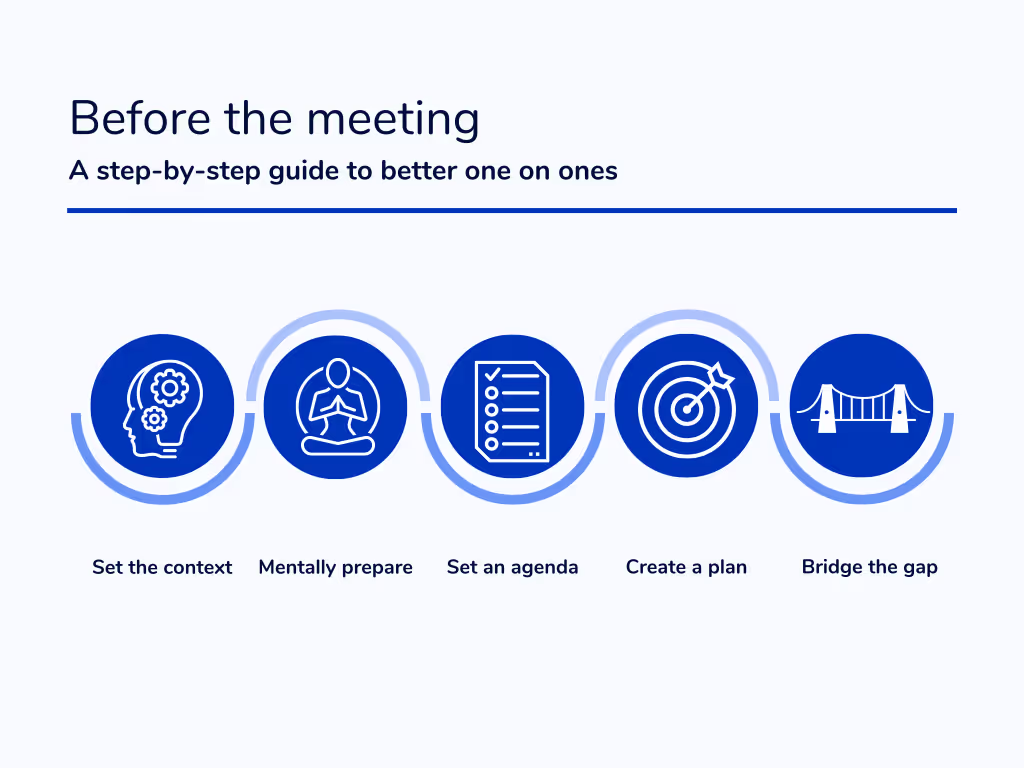A good manager will agree - it’s sort of relieving to hear your employee’s opinions on a matter. 1 on 1 meetings, probably the best way to campaign.
“90 minutes of your time can enhance the quality of your subordinate’s work for 2 weeks, or for some 80+ hours” says Andy Grove, former CEO & co-founder of Intel.
One-on-one meetings are pivotal for fostering strong manager-employee relationships, enhancing communication, and driving team performance. However, common missteps can undermine their effectiveness. Drawing from recent studies and expert opinions, let's explore these pitfalls and how to avoid them.
6 common mistakes managers make during one-on-one meetings
1. Turning 1 on 1 meetings into status reports
"What's the progress on ‘ABC’?" is among the most typical one-on-one meeting questions. Even though it appears to be a reasonable question, it is one of the common mistakes managers make during one-on-one meetings and you must decide against it. If your employees had to merely give you updates on reports, growth chart and status of a project, it could've been emailed to you.
The goal of one-on-one meeting with managers is to discuss and realize how your employees are hanging in, unlike status updates. 1-on-1's sets a forum for coaching, mentoring, and even venting. Some of the areas you may discuss are team dynamics, overall employee engagement, professional development, employee feedback (See: 360-degree feedback questions), requests, challenges, so on and so forth.
Also Read: Your HRIS Wasn’t Built for Performance Management
2. Not preparing the meeting agenda well in advance
As per a report on Know Your Team, 36% of employees believe their manager is only "slightly prepared," while 40% believe their manager is "not prepared at all.” We know that the goal of one-on-one is to go beyond workplace conflicts. But without a clear agenda, the value of a discussion will suffer. It might simply become just another meeting in your day if you don't haven't set the agenda for the meeting, asking the right one-on-one meeting questions can help.
Workplace stress and time limits frequently get the best of us. But a well-planned agenda is achievable if you’re prepared with at least a list of bullet topics that you'd like to discuss.
Also Read: The Ultimate Guide to Objectives and Key Results
.avif)
3. Doing most of the talking
“During the meeting, since it’s the employee’s meeting, the manager should do 10% of the talking and 90% of the listening. Note that this is the opposite of most one-on-ones,” says the author Ben Horowitz.
Pro tip: Active Listening
Margaret Moore, CEO of Wellcoaches Corporation, says having an efficient 1-on-1 meeting software with managers "requires real cognitive agility," Likewise, it's critical to tune your approach. Your motive is not to start or delegate new projects, defend decisions, or advocate for the team's vision which is a common mistakes managers make during one-on-one meetings. It is to figure out where your direct report is.
Don't forget a few things you can do to make sure your direct reports are speaking the most:
- Encourage employees to prepare particular discussion points.
- Suggest some open-ended questions to make employees feel comfortable and get them thinking on those themes.
- Bring employees' points to the front of the meeting's agenda (so they kick-start the conversation).
1-on-1 meeting software display how you value and recognize your employees to build rapport. It’s also a manager's responsibility to bring the discussion back on course whenever it deviates.
4. Not being mentally present
The purpose of planning effective one-on-one meetings is to have a valuable, richest type of communication. Distractions must be kept to a bare minimum by the managers. One of the mistakes managers make during one-on-one meetings is peering into the phone or checking e-mails during a meeting which might sap your team's motivation.
Coming prepared, shutting off notifications on your phone, starting on time, and attentively listening, all contribute to being more actively present in one-on-one meetings.
5. Being in a hurry, rescheduling, or cancelling
One-on-one meetings are frequently more rushed and disorderly than they need to be. When you engage with someone one-on-one, you get a sense of their ongoing duties and the red flags for the time they start to waver. When you postpone or cancel the meeting, you will miss out on that portion of the pulse, making it a common one-on-one meeting mistakes.
Cancelling a 15–30-minute conversation might send a message to your direct report that they're not a priority. It might also reach a point where you find your employees communicating in a less effective manner, such as crowding your inbox or lingering around your desk.
Additional Reading: 6 Reasons Why You Need A Performance Management System in Maldives
6. Not planning 1-on-1 meetings as a regular event
Employees whose managers meet with them on a regular basis are nearly three times as likely to bring employee engagement whose managers do not meet with them on a regular basis, according to Gallup. It doesn't concern how often they happen, but management's role must be to schedule one-on-one meetings on their calendar as a recurring meeting.
When you constantly perform something, it demonstrates that you value it. Giving some time to free up time may sound paradoxical, but that is exactly what one-on-ones can do in real time. Spending a few minutes coaching your staff lets you focus on your duties without worrying about putting out flames later.
Also Read: 5 Elements of a Performance Management Software

Settling the matter
Feel free to get out of the office for a walk or a cup of coffee if you don't want your 1-on-1 meetings be limited to a conference room. Place yourself in the framework of human compassion. Ask employees where they are stuck to address their concerns for building trust. Pay attention to their responses and assist them in turning them into a learning opportunity - whether it is performance reviews for remote employees or in office.
peopleHum's effective performance management system comes with a unique one-on-one feature that provides rapid and constructive feedback, and fosters clear communication. Along with AI in performance management that automates your review cycle, our portal allows you to add shared or private remarks.
Avoid the common mistakes managers make during one-on-one meetings. Leverage automation to grow organizational value by choosing a performance management system. Hear out our story to know more.
FAQs
What is the goal of a one-on-one meeting?
To strengthen communication, build trust, and support employee growth through personalized conversations.
How long should a one-on-one meeting last?
Typically 30 to 60 minutes, based on team needs and agenda depth.
What should be discussed in one-on-one meetings?
Performance feedback, career goals, challenges, recognition, and personal development—not just project status.
How often should managers hold one-on-one meetings?
Weekly or biweekly is ideal to maintain connection and consistent feedback.
What are the most common one-on-one meeting mistakes?
Being unprepared, dominating the conversation, skipping meetings, and not following up on action items.
Why should managers avoid using 1-on-1s for status updates?
Because it wastes valuable face time that should focus on deeper, personal, and strategic discussions.
How can managers improve their one-on-one meetings?
By preparing an agenda, listening actively, documenting takeaways, and fostering a safe space.
Are remote one-on-ones as effective as in-person?
Yes—when structured well, remote 1-on-1s can be just as impactful with the right tools and focus.































%20(1).avif)


















